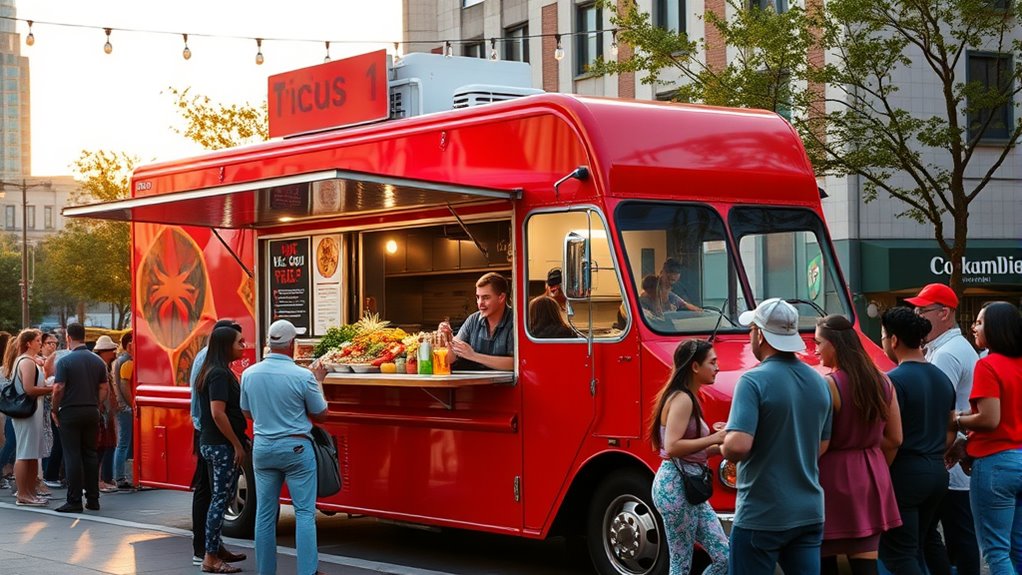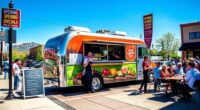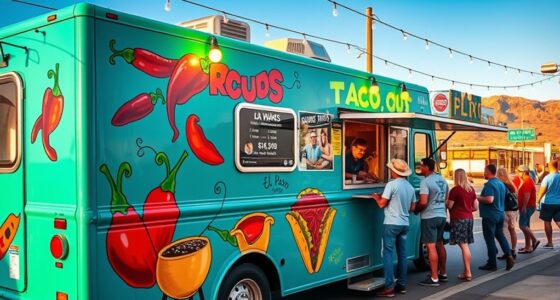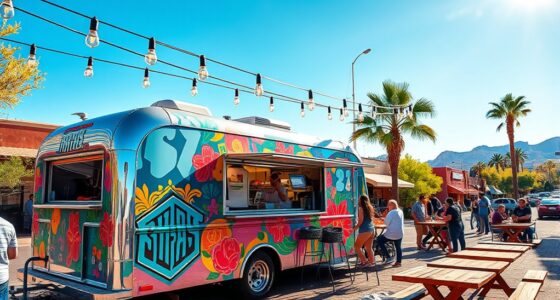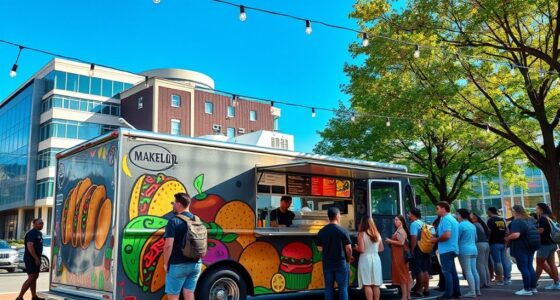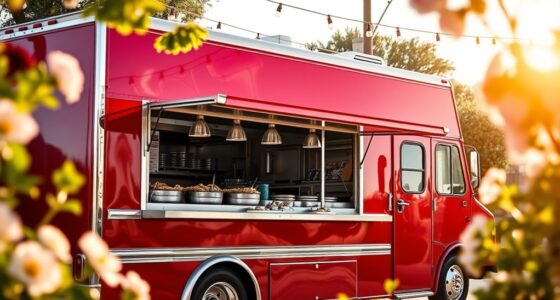To start a food truck in Columbus, OH, you’ll need to understand local permits, health requirements, and parking regulations. Develop a strong brand and menu, focus on community engagement, and participate in festivals to boost visibility. Budget for vehicle customization and equipment, and use social media to attract customers daily. If you keep exploring, you’ll discover how to navigate permits, grow your presence, and succeed in Columbus’s vibrant food scene.
Key Takeaways
- Research Columbus’s food scene, community preferences, and popular event locations to target your food truck’s niche.
- Obtain necessary permits and licenses through online portals, ensuring compliance with local health and parking regulations.
- Develop a unique, eye-catching brand and menu with creative items to stand out in Columbus’s competitive market.
- Secure financing for your food truck and equipment, and consider liability insurance to protect your investment.
- Engage with local festivals, social media, and community events to promote your food truck and build a loyal customer base.
Navigating Columbus’s Food Scene
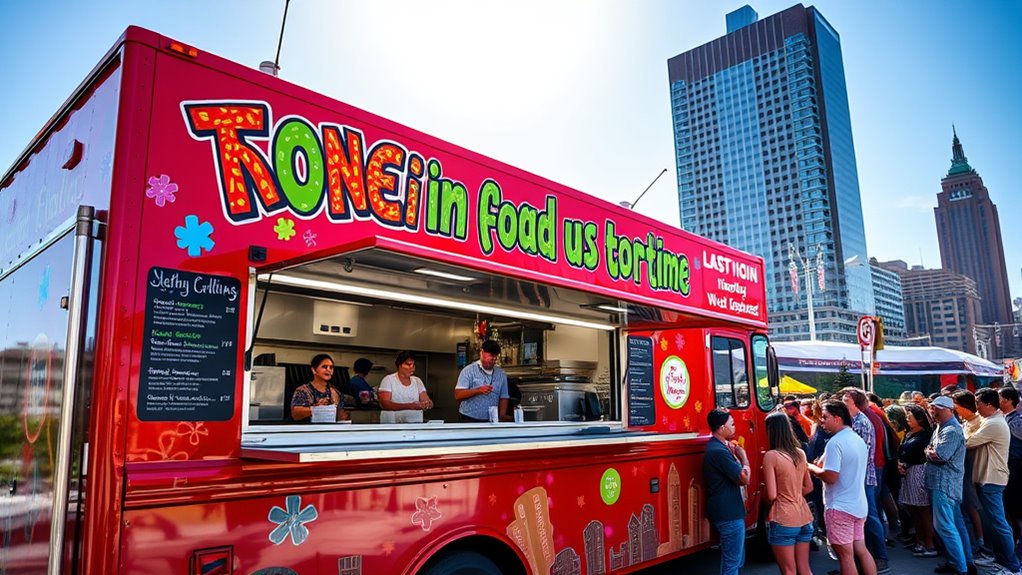
Exploring Columbus’s food scene is an exciting adventure, especially with the city’s vibrant mix of traditional and innovative eateries. To stand out, focus on strong food truck branding that captures your unique identity and appeals to local tastes. Use eye-catching visuals and a memorable name to attract customers. Social media marketing is essential—you should actively engage with your audience on platforms like Instagram and Facebook to promote daily locations, specials, and events. Posting high-quality photos and responding to comments helps build a loyal following. Keep an eye on local food trends and collaborate with other vendors or participate in community events. This approach will help you navigate Columbus’s diverse culinary landscape and establish your food truck as a must-visit destination. Incorporating themed or creative menu items can also attract more customers and set you apart from the competition.
Understanding Local Requirements
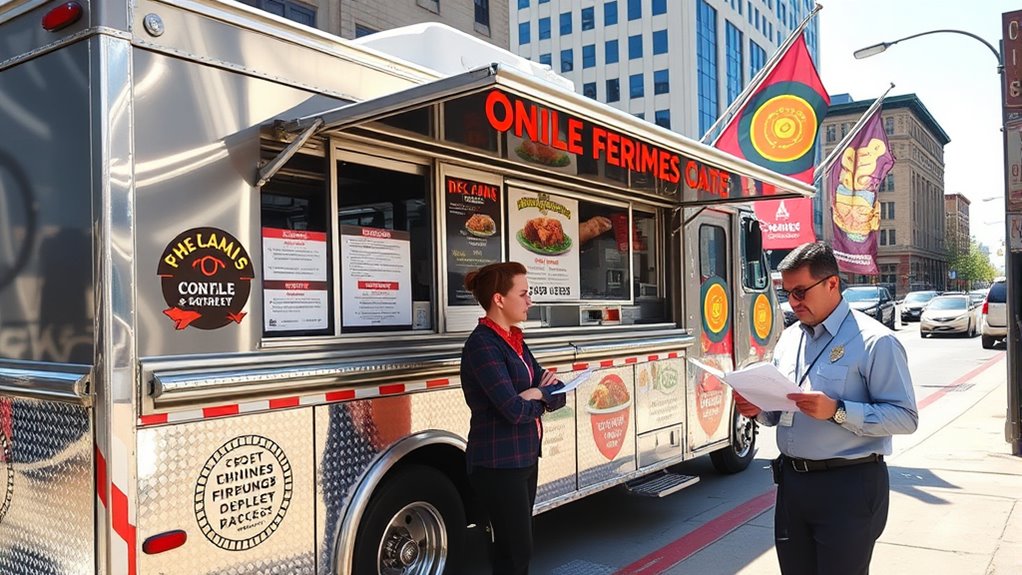
To operate a food truck in Columbus, you need to understand the local requirements, starting with online permit application portals. You’ll also need to follow specific sanitation protocols and keep detailed records to stay compliant. Additionally, make sure you park only in designated street zones to avoid penalties. Be aware that compliance includes understanding local regulations related to licensing and inspections to ensure your food truck operates legally.
Online Permit Application Portals
Finding your way through the online permit application portals is essential for getting your food truck up and running in Columbus. These online permit portals streamline the process, allowing you to submit applications quickly and efficiently. You’ll want to familiarize yourself with the specific portals used by local agencies, such as the Columbus Department of Health and city licensing offices. When you’re ready for application submission, make sure you have all required documents, permits, and fees prepared beforehand. The portals often provide step-by-step guidance to help you complete each part of the process accurately. Taking advantage of these digital tools saves time and reduces errors, making it easier to meet local requirements and move forward with your food truck venture in Columbus.
Sanitation Protocols and Recordkeeping
Are you aware of the specific sanitation protocols and recordkeeping requirements for operating a food truck in Columbus? Maintaining food safety is critical, and local regulations emphasize proper sanitation procedures to prevent contamination. You’ll need to regularly clean and sanitize all food contact surfaces, equipment, and utensils. Additionally, strict record management is essential—keeping detailed logs of cleaning schedules, temperature checks, and pest control measures helps demonstrate compliance. Columbus’s health department may require you to store these records for a certain period, often several months. Staying diligent with sanitation protocols not only keeps your customers safe but also protects your business from potential violations. Make sure you’re familiar with local guidelines and maintain accurate, organized records to meet all food safety standards.
Designated Street Parking Zones
Understanding the designated street parking zones in Columbus is essential for ensuring your food truck operates legally and efficiently. Local parking regulations specify where trucks can park, and zone enforcement guarantees compliance. To avoid fines or penalties, familiarize yourself with the restricted areas and time limits. Keep these points in mind:
- Parking restrictions may vary by zone and time of day
- Check for signage indicating legal parking areas
- Follow zone enforcement notices carefully
- Avoid parking in zones reserved for residents or deliveries
Adhering to parking regulations helps prevent violations and ensures smooth operations. Regularly review city updates on zone enforcement policies, and always verify your parking spot before setting up. Staying compliant saves you time, money, and stress while supporting your business’s success.
Setting Up Your Base of Operations
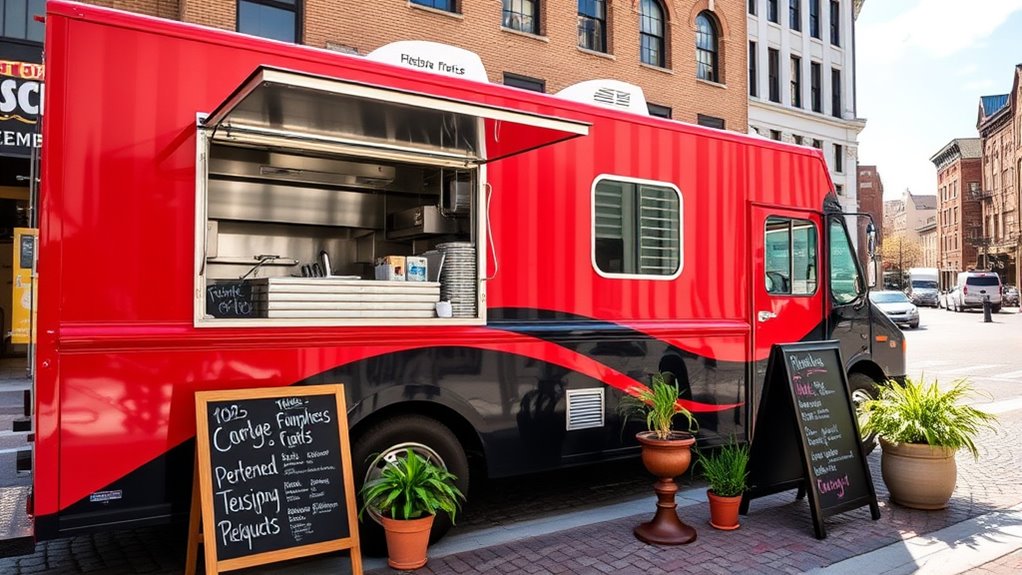
Setting up your base of operations means understanding shared kitchen licensing requirements and planning a custom kitchen layout. You need to guarantee your space meets local health codes and allows for efficient workflow. By addressing these points, you’ll create a solid foundation for your food truck business.
Shared Kitchen Licensing Requirements
Wondering what it takes to set up a shared kitchen license in Columbus? You’ll need to guarantee your space meets all local compliance standards for shared kitchen licensing. This means adhering to health and safety regulations, maintaining proper sanitation, and ensuring equipment is approved and regularly inspected. Key steps include:
- Registering your kitchen with local health authorities
- Meeting Ohio’s food safety and sanitation standards
- Keeping detailed records of food prep and cleaning routines
- Passing inspections to verify compliance standards
Custom Kitchen Layout Planning
Designing your kitchen layout is a crucial step in establishing a functional and efficient base of operations. Focus on kitchen ergonomics to guarantee your workflow flows smoothly, reducing fatigue and increasing productivity. Start by evaluating your equipment and storage needs, placing frequently used appliances within easy reach. Layout optimization involves creating designated zones for prep, cooking, and cleaning to minimize movement and streamline operations. Consider traffic patterns to prevent congestion and ensure safety. Use vertical space for shelving and storage to maximize floor area. Clear pathways and logical placement of items will improve efficiency and safety during busy service times. A well-planned kitchen layout not only enhances productivity but also helps maintain compliance with health regulations, setting a solid foundation for your food truck business.
Budgeting and Financing Your Food Truck
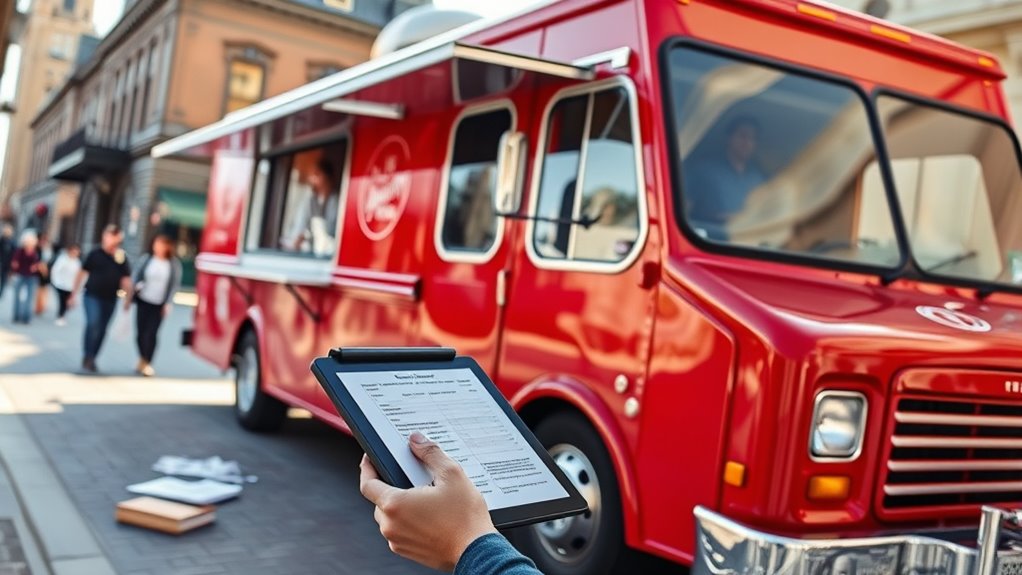
When budgeting for your food truck, you’ll need to contemplate initial vehicle customization costs and explore commercial financing options to keep expenses manageable. Securing the right financing programs can help you get started without draining your savings. Don’t forget to include liability coverage to protect your investment as you hit the streets. Be aware that security vulnerabilities in new payment technologies can expose your business to fraud if not properly managed.
Initial Vehicle Customization Costs
Initial vehicle customization costs can vary widely depending on the size of your food truck, the equipment you need, and the level of branding you want to achieve. If you’re going for a bold look, investing in a custom paint job or a vehicle wrap can considerably impact your budget. These options help your truck stand out and attract customers. Keep in mind:
- Custom paint offers a unique, personalized appearance but can be costly.
- Vehicle wraps are a cost-effective way to promote your brand without permanent changes.
- Upgrading kitchen equipment influences overall costs.
- High-quality branding materials improve visibility and appeal.
Planning for these expenses early helps you allocate funds wisely. Remember, your truck’s appearance is a key marketing tool that can make or break customer interest.
Commercial Vehicle Financing Programs
Are you unsure how to finance your food truck without draining your savings? Commercial vehicle financing programs can help you get the funds you need while keeping your budget in check. Many lenders offer specialized loans for food trucks, often with competitive interest rates and flexible terms. When choosing a financing plan, consider fuel efficiency, as it impacts your ongoing operating costs, and make certain the loan covers necessary vehicle maintenance to keep your truck running smoothly. Some programs even offer lower rates for trucks with better fuel economy, helping you save money long-term. By exploring these options, you can secure the right financial support to start your food truck business without overextending yourself financially.
Liability Coverage for Food Trucks
Securing adequate liability coverage is vital to protect your food truck business from potential financial setbacks. Insurance essentials like liability coverage ensure you’re covered in case of accidents, injuries, or property damage. Without proper liability coverage, a single incident could threaten your entire operation. To make informed decisions, consider:
- The coverage limits needed for your specific business
- Additional protections like product liability
- State requirements for food trucks in Columbus
- Comparing quotes from different providers
Having comprehensive liability coverage gives you peace of mind and safeguards your investment. It’s an indispensable part of budgeting and financing your food truck, helping you avoid unexpected costs. Remember, well-chosen insurance essentials keep your business safe and compliant, letting you focus on serving delicious food.
Designing Your Menu and Pricing Strategy
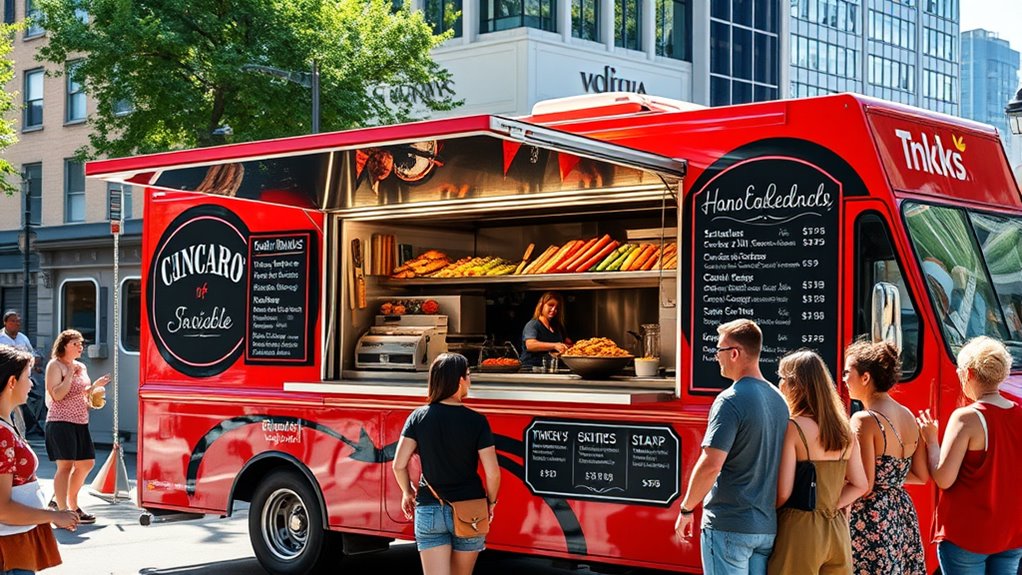
When designing your menu and pricing, consider sourcing ingredients locally to keep costs down and guarantee freshness. Implement cost control techniques to maximize your profit margins while offering quality dishes. Balancing these strategies helps create a menu that appeals to customers and sustains your business.
Local Ingredient Sourcing Strategies
Incorporating local ingredients into your menu not only supports nearby farmers but also lets you craft fresh, distinctive dishes that attract customers. To succeed, focus on sourcing local herbs and partnering with farmers to guarantee quality and consistency. Building relationships with local producers helps you access seasonal ingredients and stay ahead of trends. Consider these strategies:
- Visit farmers’ markets regularly to discover new suppliers
- Establish direct communication with farmers for fresh herbs
- Develop a network of trusted local growers
- Incorporate seasonal ingredients to keep your menu exciting
Cost Control Techniques
Designing your menu and pricing strategy is essential for managing costs effectively and ensuring profitability. By carefully selecting menu items, you can focus on dishes that maximize profit margins and minimize waste. Implement cost tracking to monitor ingredient expenses and identify areas where you can reduce costs without sacrificing quality. Consider portion control to prevent over-portioning, which can lead to higher expenses. Price your items strategically, balancing customer expectations with your need to cover costs and generate profit. Regularly review your expenses and adjust your menu accordingly to promote expense reduction. Keeping a close eye on your costs allows you to make informed decisions, avoid unnecessary expenses, and maintain a healthy profit margin in your food truck business.
Technology and Operations
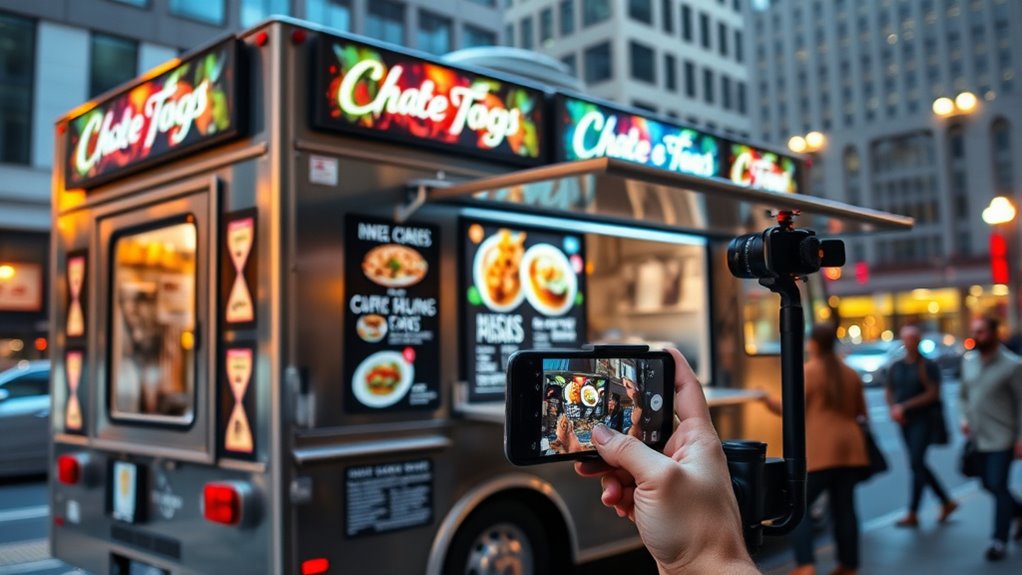
Using wireless card readers allows you to accept payments on the go, making transactions faster and more convenient for your customers. Mobile POS systems help you manage sales and orders seamlessly, even in tight spaces. Inventory apps keep you updated on stock levels in real-time, so you’re always prepared. Incorporating juice cleanse benefits into your menu offerings can attract health-conscious customers and boost sales.
Wireless Card Readers for Mobility
Have you considered how wireless card readers can transform your food truck’s mobility and efficiency? With wireless card readers, you can accept mobile payment solutions anywhere, speeding up transactions and reducing lines. These devices simplify your setup, allowing you to process payments on the go without bulky equipment. Key benefits include:
- Increased transaction speed
- Greater customer convenience
- Reduced hardware clutter
- Enhanced mobility during busy hours
Wireless card readers connect seamlessly to smartphones or tablets, making them ideal for a mobile operation. They ensure secure, quick payments, which can boost customer satisfaction. Plus, with the latest mobile payment solutions, you stay ahead of competitors and cater to customers who prefer cashless options. Overall, these devices are essential tools for maximizing your food truck’s efficiency and customer experience on the move.
Mobile POS and Inventory Apps
Wireless card readers streamline payment processes, but managing sales data and inventory on the go requires more than just quick transactions. A reliable mobile POS system simplifies this by integrating sales, customer data, and inventory management in one device. With a mobile POS, you can track daily sales, process refunds, and analyze performance in real-time. Inventory apps complement this by helping you monitor stock levels, reorder supplies, and prevent shortages during busy hours. These tools ensure you stay organized and responsive, reducing errors and saving time. Investing in a robust mobile POS paired with inventory apps enables smooth operations, improves customer service, and keeps your food truck running efficiently. Staying on top of sales and inventory is essential for success in Columbus’s competitive food scene.
Marketing and Growing Your Presence
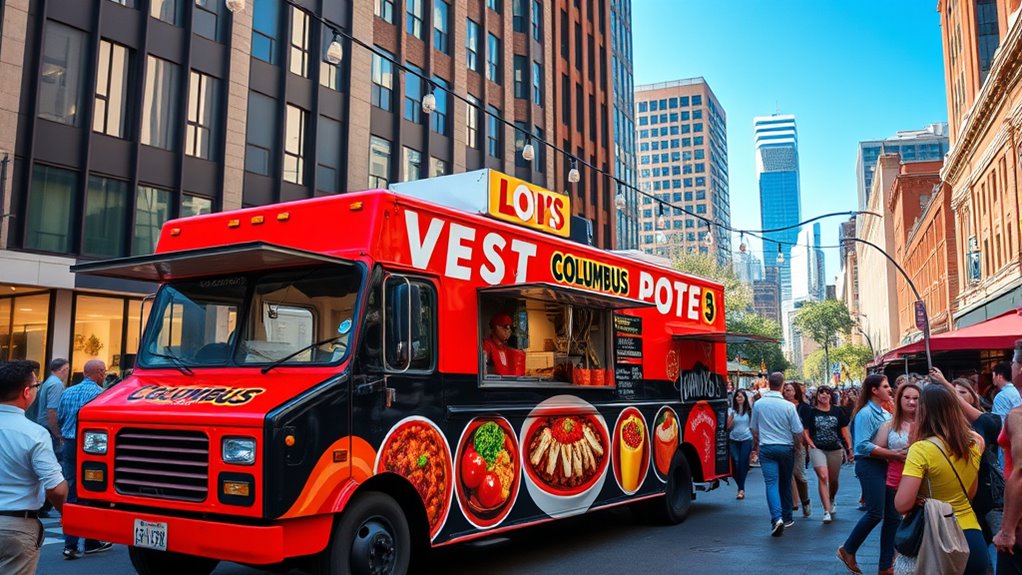
To boost your visibility, focus on scheduling your appearances at popular events when foot traffic is high. Engaging local food bloggers can also help spread the word and attract new customers. By combining these strategies, you’ll grow your presence effectively in the Columbus food scene. Incorporating essential oils into your marketing—such as hosting aromatherapy demonstrations—can also create a memorable experience for attendees.
Popular Event Scheduling Tips
Scheduling your food truck events strategically can substantially boost your visibility and customer base. Focus on effective event scheduling by considering seasonal planning to align with local festivals, holidays, and busy weekends. This ensures you’re present when demand is highest. To maximize impact, keep these tips in mind:
- Coordinate with community events and markets
- Avoid overlapping major competitors’ events
- Schedule during peak lunch and dinner hours
- Plan for seasonal shifts and weather patterns
Engaging Local Food Bloggers
Engaging local food bloggers can markedly boost your food truck’s visibility and attract new customers. By building relationships with bloggers, you enhance your food truck branding and increase social media engagement. Reach out with personalized messages, invite them to try your menu, and encourage honest reviews. Collaborate on posts or events to expand your reach. Use the table below to identify key blogger types and engagement strategies:
| Blogger Type | Engagement Strategy |
|---|---|
| Food Critics | Offer exclusive tastings |
| Local Lifestyle Influencers | Share behind-the-scenes content |
| Niche Food Enthusiasts | Create themed events or specials |
Consistent interaction helps create buzz around your truck, fostering loyal followers and drawing curious new customers.
Master Local Food Festivals
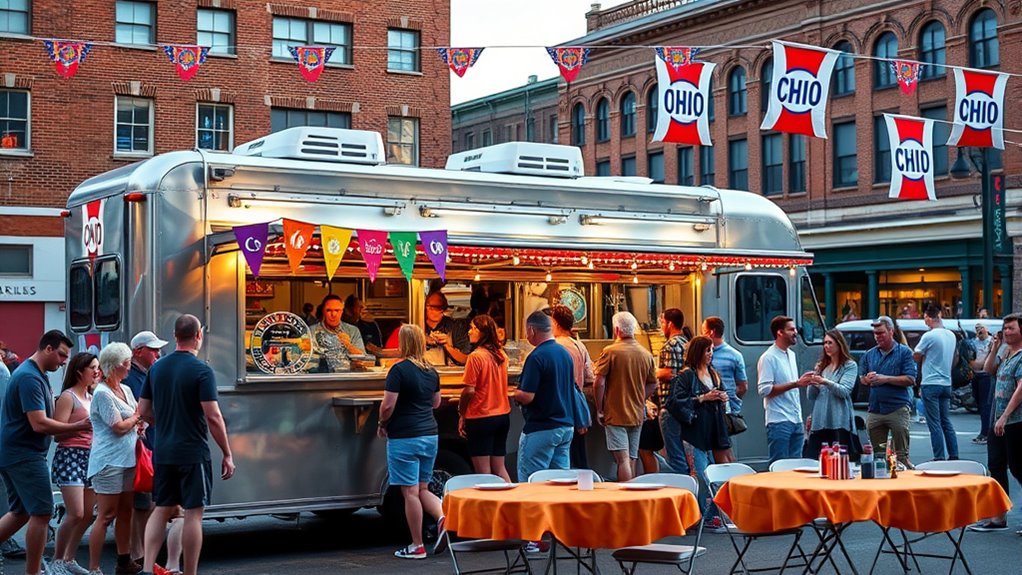
Attending local food festivals in Columbus is a fantastic way to experience the city’s vibrant culinary scene. To master these events, focus on building strong food festival partnerships that can boost your visibility and credibility. Collaborate with event organizers and other vendors to create mutually beneficial arrangements, like cross-promotions or shared booth spaces. Use targeted event promotion strategies such as social media campaigns, local media outreach, and engaging visuals to attract more visitors. Keep these tips in mind:
Building strong festival partnerships and strategic promotion boosts your food truck’s visibility in Columbus events.
- Establish relationships with festival organizers early
- Leverage social media for real-time updates
- Offer unique menu items to stand out
- Network with other vendors to expand your reach
Mastering local festivals helps you connect with your community and grow your food truck business effectively.
Frequently Asked Questions
What Are the Best Locations to Park My Food Truck in Columbus?
You should park your food truck at popular downtown spots like Easton Town Center or Short North, where foot traffic is high. Attend food truck festivals like Columbus Food Truck Festival to gain visibility. Additionally, consider busy parks and event venues that attract crowds. By positioning yourself in these high-traffic areas and events, you’ll maximize your sales and build a loyal customer base in Columbus.
How Do I Obtain a Food Handler’s Permit in Columbus?
To obtain a food handler’s permit in Columbus, you need to complete the food safety certification course, which covers proper food handling and safety practices. Then, follow the permit application process through the Ohio Department of Health or local health department website. Submit your certification, fill out the application, and pay any required fees. Once approved, you’ll receive your permit, ensuring you meet all health regulations for operating your food truck.
Are There Any Columbus-Specific Health Inspections for Food Trucks?
Yes, Columbus has specific health inspections for food trucks. You’ll need to adhere to Columbus health codes and mobile vendor regulations, which include regular inspections to guarantee safety and hygiene standards. These inspections cover food storage, preparation, and sanitation practices. Make sure you schedule inspections with local health authorities and follow the guidelines closely to avoid violations. Staying compliant helps you operate smoothly and serve quality food to your customers.
What Are Common Legal Pitfalls for New Food Truck Owners in Columbus?
You should watch out for legal pitfalls like missing permits and licensing, which can halt your operation. Make certain you secure all necessary health permits, business licenses, and parking approvals specific to Columbus. Also, consider liability concerns by obtaining adequate insurance coverage to protect against accidents or legal claims. Failing to address these issues can lead to fines, penalties, or even shutdowns, so stay proactive in complying with local regulations.
How Can I Connect With Local Columbus Food Truck Communities?
Think of the Columbus food truck scene as a bustling beehive—you need to join the swarm. Immerse yourself in local food truck meetups and online community groups to connect with fellow owners. These platforms are your golden tickets, offering advice, support, and opportunities to collaborate. Attend events regularly, ask questions, and share your journey. Building relationships now will turn your food truck dreams into a thriving, flavorful reality.
Conclusion
Starting a food truck in Columbus means tapping into a vibrant, growing food scene—over 60% of residents dine out weekly. With the right permits, a strategic location, and a standout menu, you can turn your passion into profit. Remember, flexibility and innovation are key. Embrace local festivals and community events to boost your presence. If you do it right, you’ll be part of a thriving industry, serving delicious food and making lasting connections.
